Clutching a page of notes, Bob Russo sat in the middle of the boisterous audience in the school gymnasium, reviewing what he wanted to tell the Douglas County School District board members. When it was his turn to speak, Russo stood and approached the microphone.
“I don’t know about you, but I don’t want Marxist blood in this country,” he said, generating widespread applause.
This was Russo’s third school board meeting in eight days. Officials were holding town halls across the rural northwest Nevada county to address concerns roiling the community, such as whether students were learning critical race theory (CRT) in classrooms, or whether children should wear masks or get vaccines to protect them from Covid-19.
“I’m concerned about kids being taught theories, ideologies that are going to divide them and set them apart from each other,” Russo said to CNN in an interview. “I’m concerned about our freedom.”
Russo, a 68-year-old retiree, has no children in the school district.
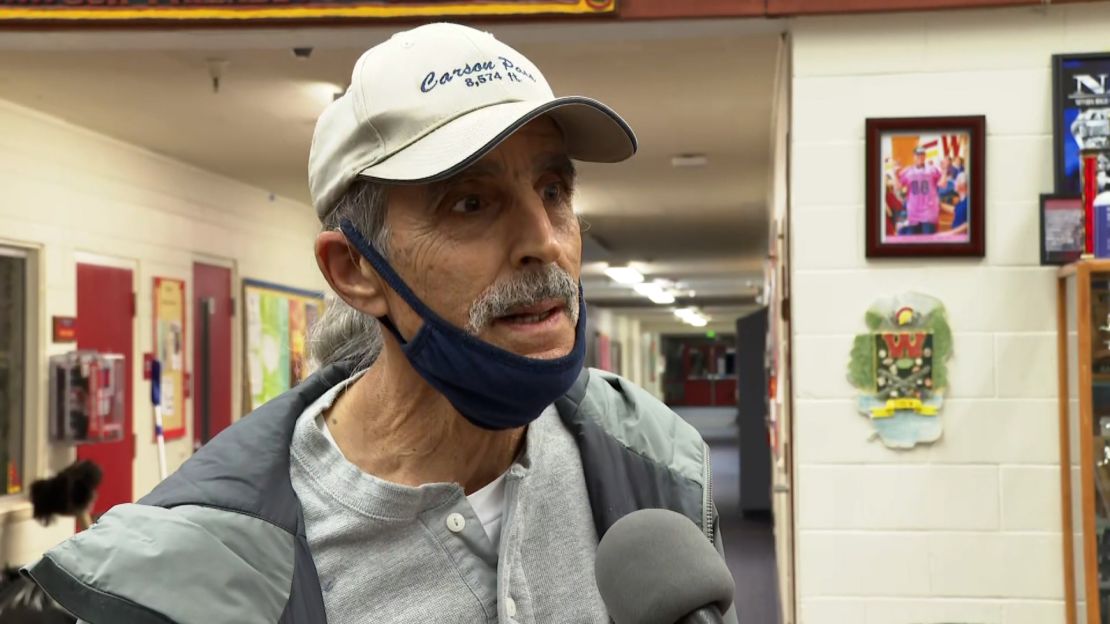
“I love the kids, even though I don’t know them,” said Russo. “I just want to see them have happy lives, being able to pursue happiness the same way I was able to. It’s more of a national issue, that’s my concern. And I’m just doing a little bit that I can do.”
Russo was not alone. Mladen Chargin also has no children in the school system but says he’s interested as a taxpayer about what’s going on.
“The only purpose,” Chargin says of CRT, “is the division and destruction of the United States. That is the purpose.”
For months now, school board meetings across the nation have been targeted with angry protests over masks and vaccines, joined more recently by concern about racial equity. Elections have become vitriolic and divisive and the National School Boards Association has asked for help from the federal government to investigate threats.
Douglas School District Superintendent Keith Lewis told the crowd that CRT was not a part of the public-school curriculum.
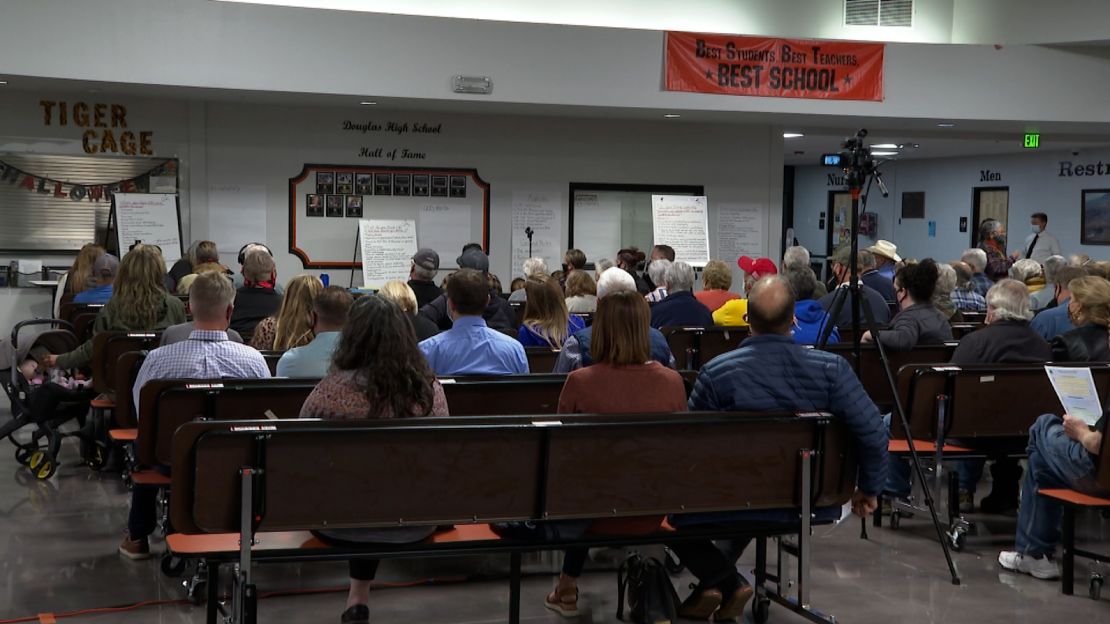
That mattered little to a non-resident of Douglas County, Adam Laxalt. A former attorney general of Nevada who now wants to represent the state in the US Senate, Laxalt has seized on the national GOP strategy of clashing with Democrats on cultural issues. This appearance before this small town’s school board would not be any different.
“I call on this board to permanently ban critical race theory and all of its appendages,” Laxalt said at the board meeting to loud applause from the crowd.
Children try to school the adults
The behavior of the adults on this night – and for many months in the majority White community of 50,000 on the shores of Lake Tahoe – has been astonishing to watch, say Jacob Lewis, 16, who is not related to the superintendent, and 17-year-olds Sydney Hastings and Kimora Whitacre. All of them are students at Douglas High School.
“I think that sometimes people misinterpret discussion of racial issues to be critical race theory,” said Hastings, a senior.
“I feel they don’t understand that our school doesn’t even have CRT,” said Lewis, a junior. “They’re arguing for something that we don’t even have.”
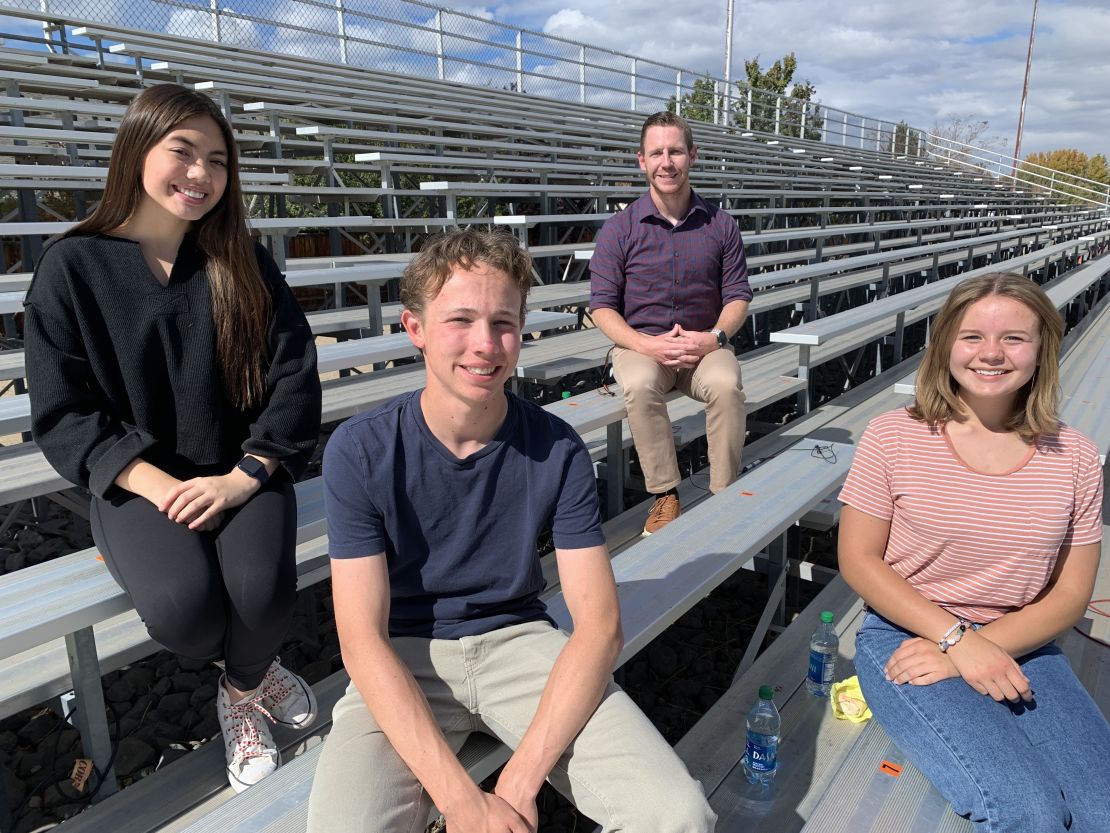
Whitacre, a senior, listened in on one of the school meetings via the public Zoom link. She didn’t recognize any of the speakers who complained to the school board as parents. But she knows what the rancor was doing to her teachers.
“You can see the wear it takes on our administrators,” Whitacre said. “They’re just trying to educate us. That’s where I get disappointed. We’re just trying to learn.”
Whitacre says she felt the impact too, particularly when anti-mask protesters were on the sidewalk outside her school. “There have been times where I’ve driven through this town and been scared because of protests going on,” she said.
“This is a good community,” Hastings said. “That’s why it’s disappointing when you hear about people who are threatening violence, who are getting aggressive at these meetings, because I think that really is a minority.”
The three students say anger at the school board meetings over masks, vaccines and CRT overshadows the more substantive problems facing the district – a lack of substitute teachers, emotional struggles with returning to school and the ongoing fear of a shutdown of schools.

“I’m trying to balance everything that’s on my plate,” Lewis said in explaining how he is juggling the stress of athletics, homework and advanced placement exams. “I feel like I’m running a 5K when I had barely walked last year because of Covid. It was a very different time.”
Hastings agreed. “It has been a really hard few years because of the pandemic and just the amount of social strife and political division going on in our country right now,” she said.
National politics usurping local issues
Superintendent Lewis helped to organize the town halls so the board could hear directly from people about their concerns. But he wishes there was less talk about CRT and more passion for helping students directly.
“It’s taken the eye off of what we’re really trying hard to do and that’s educate our students and provide a great learning environment for them,” he said. We’re spending a lot of time and energy on issues that don’t help that.”
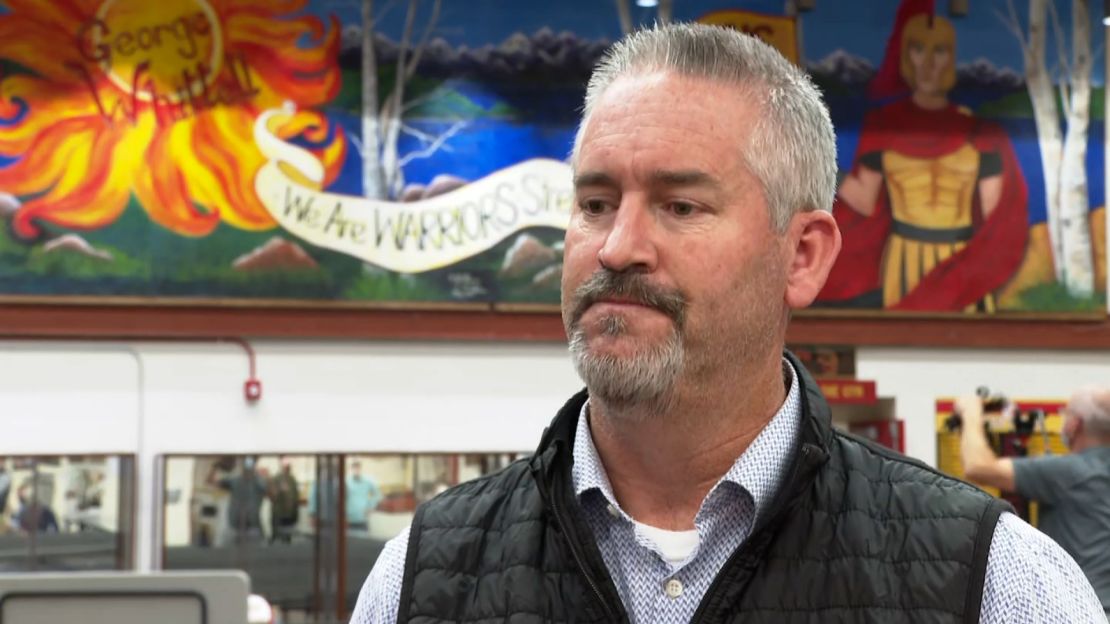
Douglas County schools rank their test scores in the top 20% of public schools in Nevada and have a graduation rate in the top 5% of the state.
But it’s been hard to find substitute teachers and deal with the social and emotional learning of students after the disruption of the pandemic and virtual schooling, teachers said.
“The thing that is the most important that we’re dealing with now is social, emotional learning and getting students equipped to handle what they have in front of them and all the expectations that society has thrust on them,” Douglas High School English teacher Jim Tucker said. “It’s never been harder to be a teenager.”
Few people at the town hall raised those concerns.
“There’s a lot of misinformation out there from people who have never been in any of our schools, who have never talked to any of our teachers, who have never asked any questions of the district. They hear things and they make assumptions,” Superintendent Lewis said.
The fear and anger at the Douglas County school board meetings are echoed around the country.
In central Florida, a woman wearing a Stars and Stripes T-shirt with the words “Free America” told a Brevard County school board meeting that children were being brainwashed by a CRT-driven public education system. “We need to come together to pull our children out of these government camps and not let them socially condition them anymore, because our children have a voice.”
In West Bend, Wisconsin, a woman who spoke before the school board called CRT “divisive, biased, radically left Marxism designed to further alienate our American children from each other.”
These school board debates are being amplified in early campaigns from the Rust Belt to the Sun Belt, as national Republicans focus on cultural issues to rally conservative voters.
In Virginia’s gubernatorial race, GOP candidate Glenn Youngkin has made what he calls parental rights key to his campaign, focusing earlier this month on CRT at a rally in Culpeper, Virginia.
“We’ve seen parents saying, ‘Tell us what material is being used in the classroom and the library, just tell us so that we can choose if we want it in our kids’ lives or not.’ Because guess what? Parents have a fundamental right to be engaged in their kids’ education,” Youngkin said. “We’re going to stand up for parents. We’re going to stand up for students. And we’re going to stand up for so many teachers that have just been asking for help.”
Rage reaches Congress, and is likely to persist
Laxalt, who wants voters to make him the Republican candidate to oppose Democratic incumbent Sen. Catherine Cortez Masto, struck a similar tone back in Douglas County.
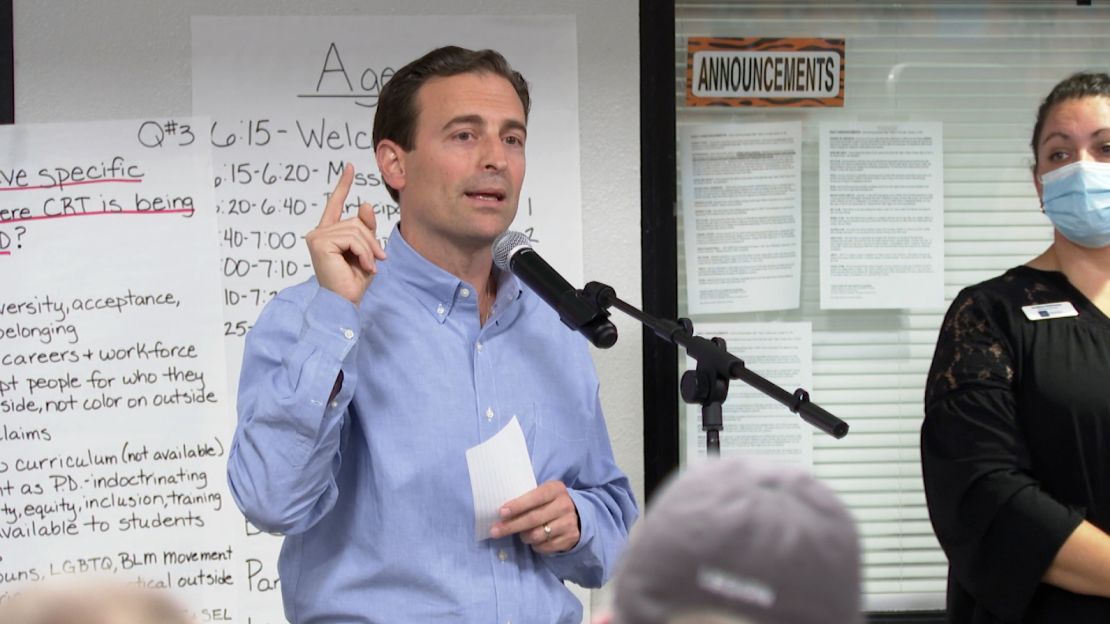
“It’s important to rise for our children today and in the coming days ahead,” Laxalt said to the school board and the crowd. Saying the country faced a “legitimate, existential threat for the future of our country,” Laxalt called CRT “inherently racist and oppressive.”
He said, “We will not let these people take our children. We will not let them indoctrinate them. We will not let them poison our children with this rhetoric. We will stand up for them and I’ll be right there with you!”
Hostility at school board meetings across the country has even been discussed in Congress.
US Attorney General Merrick Garland was before the Senate Judiciary Committee when he addressed a memo asking federal agents to consult with local law enforcement to assess threats. At that meeting, Sen. Ted Cruz of Texas defended a parent who made a Nazi salute to school board officials.
That once-mundane school board meetings are now discussed at the Senate Judiciary level shows the national reach of this cultural issue. And it’s one reason the fury is unlikely to wane until after the 2022 midterms.
The Douglas High School students find that both demoralizing and poor modeling for the children in the public schools.
“We should be listening to each other instead of fighting and understanding how the other person thinks,” said Jacob Lewis. “And more importantly why they think that way and listening to their argument. Those adults are supposed to be our role models.”
CNN’s Martha Shade contributed to this story.


















